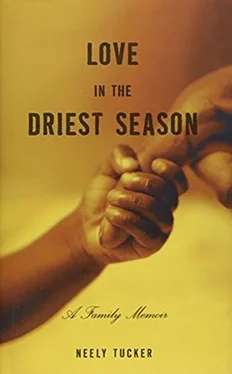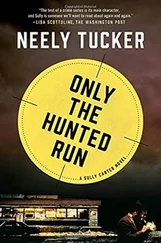After school, I worked in a grocery store called Market Basket, stocking shelves and carting out groceries, and it was one such working afternoon that finally opened my eyes and ended my youthful career as someone who tossed off racial epithets. I was stocking shelves with a guy named Theron Lawrence, a student at the public high school. Theron was black, older, and infinitely cooler than I had any hope of being. We decided to get a Coke, punch out on the time clock, and take one of our allotted fifteen-minute breaks. It turned out we had both seen the horror movie Alien the previous weekend. We were doing what teenage guys do, talking it up, laughing, retelling the scary stuff, when I brought up the part in which actor Yaphet Kotto slugged the creature.
“Boy, did the nigger knock the shit outta ’im or what ?” I chortled.
Theron’s laughter stopped.
I was aghast. You were supposed to use the N word only among white people. Jesus, but I knew that. Theron looked down for a minute, then glanced up at the clock. “Looks like break time about through,” he said, standing, and then he was gone.
Sitting in that chair, my blue store apron on and a stupid look on my face, I think I understood for the first time that the word I used had said nothing about Theron, about the actor, or even about black people in general. It said boatloads, however, about me. And I didn’t like what that said at all, because I liked Theron. I thought of him as my friend. I liked bagging groceries for Mary Banks, the store’s chief clerk. She was funny, warm, and personable in the way that southern women are. She called me “honey” or “sugar” (pronounced “shugah”). And yet she was black, and that meant a whole raft of things that existed in a universe parallel to my own, none of which I was supposed to consider good or admirable.
When I put down my adventure stories and started reading about my home state, books by William Faulkner and Richard Wright and Eudora Welty and Willie Morris, I began to get a sense of where I was. It would eventually form one of the central lessons of my personal and professional life: I had been raised in the heart of the most racist state in America, and as a child, I had accepted the perverse as normal. This is not a happy thing to learn about yourself or about the place where you grow up.
So while Mississippi was changing, I was too, and in ways I couldn’t always name. The small-town lethargy, the religious hypocrisy, the racial chasms and complaints, the numbing poverty-all of this was home, and it came to weigh on me a great deal. I began to drive my beat-up car around late at night, down little country highways and dirt roads and back down shuttered Main Street, and nothing had changed except the night was an hour older, and I would wonder if I was ever going to go anywhere or do anything.
But fate is sometimes kind, and I had the good fortune to meet Willie Morris, the famous Mississippi author, at a college baseball game. He was the first person I ever met who wrote books for a living, and he had made a career for himself far outside the state’s borders. I thought that was the summit of ambition. I told him I would like to write and travel as well. He and a professor named Tommy Miller steered me to a job at the Oxford Eagle, the smallest daily newspaper in Mississippi (circulation 2,500). I covered high school sports, murders, child abuse cases, city council meetings, factory layoffs, local elections, and a death penalty trial. I investigated a murder-suicide in a little town called Water Valley with such vigor that Yalobusha County sheriff Lloyd Defer tipped back his hat and interrupted me to ask, “Son, what kinda flesh-eating ghoul are ya tryin’ to be?”
When I wasn’t working, I was taking classes at Ole Miss on a scholarship. (They had the state’s best English program, no matter what I thought about their symbolism, and out-of-state tuition was a number beyond my imagination.) At graduation, I was named the university’s most outstanding journalism student. The stories I wrote for the Eagle had won all the regional awards for which they were eligible. I had job offers from something like a dozen newspapers.
It wasn’t difficult to choose-I picked the one farthest from home. This turned out to be Florida Today, a little daily on Florida’s east coast. I worked all the time at my new job, seven days a week, and moved from that paper to Gannett’s national wire service to the Miami Herald to the Detroit Free Press, all in three years. When I wasn’t interviewing people, I was on my motorcycle, or climbing mountains out West, or dancing at clubs until four in the morning. I let my hair grow out into a ponytail. I got an earring, a couple of tattoos, and a new set of clothes. My accent faded. I was out of Mississippi and had my foot flat on the gas pedal, heading anywhere at a hundred miles an hour.
ALL ESCAPE PLANS have a flaw, and mine was so totally conventional, so boring, that I never saw it coming. I fell in love with the girl next door.
It happened when I was living in a loft in downtown Detroit. The six-story building was an old warehouse. It housed a Greek pizzeria on the first floor, a small dance club on the second, and four more floors of unvarnished lofts. A noisy college student lived in the loft next door to mine on the fifth floor for a time; when he moved out, I posted a note on the employee bulletin board at the Free Press, mentioning that an apartment was available close to work.
No one responded for several days. Then a clerk in the paper’s library whom I knew slightly asked if she could take a look during lunch hour.
“I just want to see if it’s someplace better than where I’m staying now,” Vita Gasaway explained.
She was a widow, outgoing and funny, a five-foot-two black woman who exuded a certain Motown attitude just walking down the street. She had long braids, pride in her dark complexion, and an easy, infectious laugh. She was eleven years older than me and had come of age in Detroit in the 1960s, when some of the city’s musically inclined black teenagers were revolutionizing popular music. Most any Saturday you could go to the Motown Revue at the Fox Theater, right there on Woodward, and see Stevie Wonder, the Supremes, Smokey Robinson, the Temps, the Four Tops, and, best of all, Marvin Gaye. These many years later, she was bemused by the fact that she lived next door to a white boy from Mississippi. We were friends for two years before we thought of dating. She worked almost more hours than I did-as a paralegal by day, and at the Free Press library in the evenings. One Saturday night in the summer, when it was too hot to sleep, I pulled an old chair out on my fire escape. I saw her sitting at her window, taking the breeze too. Her loft had no fire escape, and thus no way to sit outside.
I waved to get her attention.
“I’m not trying to be cute,” I said, “but do you want a drink? It’s cooler out here.”
“Just what a girl needs,” she said. “A fresh breeze and a glass of wine.”
She came over, and I helped her step out of the huge, wide windows onto the steel fire escape. There were crowds of people in the parking lots and streets below, streaming out of the clubs and bars. The lights of the Renaissance Center spiraled up sixty or seventy floors a few blocks over. The Detroit River lay just beyond it. The lights of Windsor winked from across the water.
“This isn’t bad at all,” she said, and I relaxed, leaning against the rail.
It became a steady date. In the summers, we would pull a couple of old chairs out there, cook hamburgers on a diminutive grill, sip wine, and watch the people below. In Michigan’s bitterly cold winters, we rented movies on Sunday afternoons and hooted at the screen, throwing popcorn at bad dialogue. In between, we took the motorcycle for afternoon rides to Ann Arbor. There was a jazz dive called Bo-Macs a few blocks from our lofts, a place where I ran a tab. Vita would come in there on a Friday evening, wearing a killer red dress, her braids falling down her back, and say, “Hey, baby love,” in such a way that I would nearly forget my name.
Читать дальше











